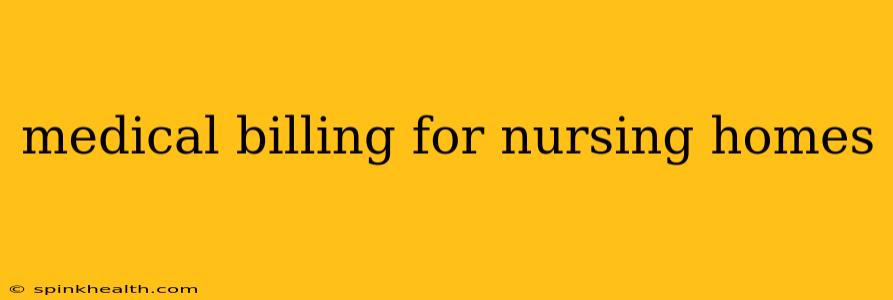The quiet hum of activity in a nursing home belies the complex financial ecosystem churning beneath the surface. While providing compassionate care is paramount, ensuring accurate and timely medical billing is crucial for the financial health and sustainability of any nursing home. This isn't just about numbers; it's about ensuring the facility can continue providing vital services to its residents. This journey into the world of medical billing for nursing homes will illuminate the intricacies, challenges, and best practices involved.
What are the Key Differences Between Nursing Home and Other Medical Billing?
Nursing home billing differs significantly from other medical billing scenarios due to the unique nature of resident care. Imagine this: a hospital visit is usually a defined period with specific procedures. Nursing home care, however, is often ongoing and encompasses a wider range of services. This means billing isn't a simple case of submitting a claim after a single procedure; it's a continuous process involving multiple codes, levels of care, and potential adjustments based on the resident's evolving needs. We're talking daily charges, ongoing therapy sessions, medications, and specialized care, all needing meticulous documentation and accurate coding to ensure proper reimbursement. The sheer volume of data and the nuances of long-term care create a much more intricate billing process.
How Do Nursing Homes Get Paid for Services?
The reimbursement landscape for nursing homes is multifaceted, involving a combination of payment models. Medicare and Medicaid play significant roles, with payment structures varying based on the resident's specific needs and coverage. Private insurance also factors in, adding another layer of complexity with its own set of rules and regulations. Many nursing homes also rely on private pay residents, meaning the direct payment from the individual or their family contributes to the facility's revenue. Understanding these various payment sources and navigating the regulations for each is crucial for successful billing.
What are the Common Challenges in Medical Billing for Nursing Homes?
The path to successful medical billing in a nursing home is rarely smooth. Accurate coding is a major hurdle, as each service needs precise coding to ensure appropriate reimbursement. Denials are another common challenge, often stemming from incorrect coding, missing documentation, or delays in submitting claims. Staffing and training also play a crucial role; dedicated, well-trained billing staff is essential for accurate and timely submissions. Then there's the ever-changing landscape of regulations and compliance, demanding continuous vigilance to ensure adherence to all applicable rules.
What Software is Used for Nursing Home Medical Billing?
Several specialized software systems streamline nursing home medical billing. These systems often integrate with electronic health records (EHRs) to facilitate efficient claim generation and submission. These aren't just simple billing platforms; they often include features to manage resident data, track payments, and generate reports for financial analysis. The choice of software often depends on the size of the facility and its specific needs, with some offering features such as automated claims processing, denial management, and reporting capabilities.
What are the Best Practices for Medical Billing in Nursing Homes?
Successful nursing home medical billing hinges on a robust strategy encompassing multiple elements. Clean claims – meaning claims free of errors – are the cornerstone of this approach. This demands meticulous documentation, accurate coding, and careful verification of resident information. Regular audits help identify areas for improvement, ensuring that the billing process runs smoothly and efficiently. Investing in appropriate billing software and training staff are also crucial, empowering them to handle the complexities of the system. Finally, maintaining open communication with payers and proactively addressing denials are essential strategies for optimizing reimbursement and ensuring financial stability.
The Future of Medical Billing in Nursing Homes
The healthcare landscape is constantly evolving, and so is nursing home medical billing. The increasing adoption of electronic health records (EHRs) and advancements in billing software are shaping the future. We can anticipate further automation, improved data analytics for better financial management, and a continued emphasis on regulatory compliance. The focus will continue to be on improving efficiency, reducing denials, and maximizing reimbursement to ensure that nursing homes can focus on delivering exceptional care to their residents.

